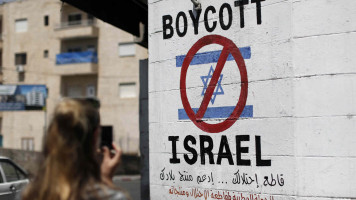Qataris complain of costly camel repatriation, held for months by Saudi Arabia
Thousands of camels stranded in Saudi Arabia will head home to Qatar next week, after an agreement was reached to allow the animals to leave via Kuwait.
The deal allows the Qataris to retrieve their animals that have been stuck in Saudi Arabia since Riyadh launched a blockade on Qatar last June.
But the Qatari camel owners complained that Riyadh has effectively held the animals to ransom and made costly conditions for their repatriation.
"The owners of the camels were forced by the Saudi authorities to transport their camels only through Kuwaiti or Saudi nationals. They were also forced to pay an amount ranging between QR2500 ($687) and QR3000 ($824) per camel," a source told Qatari newspaper, The Peninsular.
"They have exploited us in the transportation of the camels. It is not fair to pay the amount. No reason is given for the exploitation of the camel owners."
The camels were prevented from crossing into Qatar through Saudi border crossings and instead have to make the much longer journey via Kuwait's al-Shuwaikh Port next week.
Around 6,000 camels have reached Kuwait ready to be placed on ships back to Qatar.
Saudi Arabia, the UAE, Bahrain and Egypt launched a blockade on Qatar last June, accusing the Gulf state of sponsoring extremist groups - claims Doha strongly denies.
It followed the hacking of Qatar's national news agency with fake comments attributed to the country's emir published on the site. This was allegedly traced to back hackers in the UAE.
More than 22,000 camels and other livestock have been seized by Saudi authorities with owners banned from giving fodder to their animals.
Around 12,000 camels and sheep owned by Qatari farmers were forced across the desert to Qatar by Saudi authorities last year.
Qatar launched a huge operation to provide water and fodder for the herds as they reached the emirate.
Hundreds of the animals perished at the border after they were unable to reach water or food stocks in time.
The incident took place in the holy month of Ramadan during the summer's peak, when herders were fasting and temperatures soared to around 50 degrees.







 Follow the Middle East's top stories in English at The New Arab on Google News
Follow the Middle East's top stories in English at The New Arab on Google News


